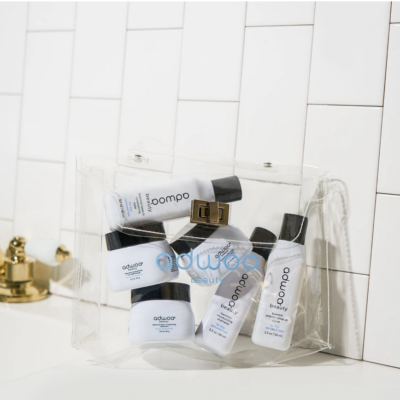
What It’s Like For Emerging Beauty Brands To Operate In A Higher Interest Rate Environment
Upon raising its key interest rate a quarter of a percentage point last week to about 5.1%, the highest rate in 16 years, the United States Federal Reserve indicated it could pause interest rate hikes in June and assess the impacts of the hikes it’s made to date. Still, the interest rate is decidedly steeper than it was when most indie beauty entrepreneurs started their companies.
Given the changed fiscal picture, for the latest edition of our ongoing series posing questions relevant to indie beauty, we asked 11 of them the following questions: How are higher interest rates affecting your business both on the back end and the front end as you encounter consumers? What have you done or what will you do to adjust to the higher interest rate environment?
- Allie Egan Founder, Veracity
For both debt and equity, businesses are forced to pay more given the interest rate environment. The hard thing for founders is no one knows how long this will last, so it is hard to tell if you should take some deals now or wait until things improve. The positive is that we are earning a big rate on our cash.
For consumers, interest rates are felt most through their house, so people who have a house are staying put, and people who don’t have a house aren’t buying one. In the short term, this may mean that they have more money for discretionary consumer spending for purchases including beauty, but, in the long term, it will likely make people nervous and curb consumer spending especially at the lower end of the market.
We have negotiated with our bank to keep a higher portion of our cash in money market mutual funds to earn additional interest.
- Preeti Luthra Founder, Pure & Cimple
The higher interest rates have definitely made it more challenging to manage our finances. We've always relied on loans to help with cash flow and to finance our growth, but now those loans are becoming more expensive.
To adjust to this new environment, we've had to get creative. On the back end, we've been looking for ways to cut costs without compromising the quality of our products. We've managed to renegotiate some of our supplier contracts, and we're investing in technology to streamline our operations and improve efficiency.
In our customer-facing operations, our primary focus has been to enhance the value we deliver to our patrons. We've rolled out a subscription program as a token of appreciation for our loyal customers, and we're in the process of devising more adaptable payment methods to simplify the purchasing process for our clientele.
Furthermore, we're channeling resources into technology that allows us to offer personalized and comprehensive advice tailored to each customer's unique skin type or condition. The goal is to ensure that every dollar our customers spends with us brings them significant value.
It's a challenging time, but we're committed to navigating these changes and continuing to provide our customers with the high-quality products they've come to expect from us.
- Carlos Barreto Founder, Cleverman
Higher interest rates have impacted our business primarily through investment and credit availability. The recent turbulence surrounding Silicon Valley Bank and First Republic Bank, recently acquired by JP Morgan, has instilled greater uncertainty around venture capital investment and tightened access to credit for startups like ours.
Consequently, meticulous cash management has become a paramount priority. In response to the higher interest rate environment, we have shifted our focus towards building a sustainable and profitable business model. The era of unprofitable startups that solely chase revenue growth is behind us. Now, it's essential for entrepreneurs to chart a path that promotes not only rapid, but also sustainable growth.
On a positive note, I believe companies that successfully navigate these challenges will emerge stronger, having built solid business fundamentals from the outset. With prospects of a more stable economy and reduced volatility on the horizon, there's potential for increased investment appetite. However, the preference will likely shift towards startups that have demonstrated an ability to manage challenging times, drive sustainable growth and generate profits.
- Aziza El Wanni Founder, The Potion Studio
Higher interest rates have definitely had an impact on both the back end and front end of our clean haircare business for textured hair. On the back end, we have experienced increased borrowing costs, which directly affect our business operations and profitability. With higher interest expenses on loans and credit lines, it becomes challenging to access capital for expanding our business, purchasing inventory or upgrading equipment.
On the front end, we have taken measures to address the potential effects of higher interest rates on our customers. While we strive to always keep our products affordable, there might be slight adjustments in pricing to offset the increased costs associated with borrowing. We understand that price sensitivity is a consideration for our customers, so we aim to strike a balance between maintaining the affordability of our products and ensuring the sustainability of our business.
Additionally, changes in consumer spending patterns resulting from higher interest rates could have an indirect impact on our business. As customers face higher costs for mortgages, credit cards or personal loans, their discretionary spending power may be reduced, which could influence their purchasing decisions, including their choice of haircare products.
To adjust to the higher interest rate environment, we have implemented several strategies. On the back end, we are actively working on optimizing our operations and closely managing expenses. This involves reviewing and refining our processes to identify areas for increased efficiency and cost savings. We are also actively engaging with our suppliers to negotiate better pricing and terms, which helps mitigate the impact of higher interest rates on our business.
On the front end, we remain dedicated to delivering value to our customers. We continue to emphasize the unique benefits of our clean haircare products for textured hair and educate our customers about the importance of natural hair care. By highlighting the quality, effectiveness, and unique selling points of our products, we aim to maintain customer loyalty and ensure that the value we offer is perceived beyond any potential price adjustments.
In terms of long-term financial planning, we are working closely with financial advisors to develop a comprehensive strategy that considers the potential impact of interest rate fluctuations. By carefully managing our finances, we aim to build contingency funds and reserves to provide a buffer against unexpected financial challenges.
While higher interest rates present challenges, our commitment to providing high-quality clean haircare products for textured hair remains unwavering. We are determined to find innovative solutions to thrive in this changing environment, adapt to the market conditions and ensure the continued success of our business.
- Gilah Elul Co-Founder and CMO, Muri Lelu
Interest rates have not in our experience affected the demand for luxury wellness and skincare products. So there has been no impact on consumer demand for our products.
And since the goal of the interest rate hike was to moderate inflation, there have been no effects on pricing of ingredients or components. Supply-side constraints were the main driver of inflation and was an outcome of the pandemic that we have been dealing with.
Where interest rates do play a role is in our long-term fundraising strategy. Rising interest rates has constrained capital and made long term growth planning even more critical for an indie brand line Muri Lelu.
- Loretta Ciraldo Founder, Dr Loretta
We haven’t felt the impact of interest rates on our business. For sure, big-ticket items like real estate and car purchases are affected. But as far as our skincare consumers and sales, we haven’t seen any drop-off.
We also aren’t borrowing at this time, so we’ve been untouched to date. We do think we need to brace for an economic downturn that will be widespread and have a broader scope some time in the coming year though.
- Anne Beal Founder and CEO, AbsoluteJOI
The goal of raising interest rates is to slow down inflation, so borrowing costs more and that impacts our consumers and their credit cards as well as the costs of borrowing for things like inventory for businesses. At the same time, higher interest rates strengthen our currency globally, so if you look at performance of the dollar versus the Chinese yuan or the euro in the past few months, you’ll notice a favorable trend where the dollar buys you more.
We are definitely seeing a cooling of consumer spending, and there was a lot of angst around the holidays as spending did not meet expectations. I think the rise in interest rates coupled with reports of layoffs in the tech sector are supporting concerns about a cooling of the economy. And while I do not think it has really happened, I do think consumers are being cautious with their spending.
As a result, we have to be clear about the value we are bringing to our customers and make the case for why they should invest in our products. We are also very focused on debt reduction as the costs of carrying that debt are rising, but bringing us no additional value.
The good side of this for some is sourcing materials from overseas will cost less as the dollar gets stronger. We source some of our natural oils from Europe, and it has been a balance between increased costs due to the war in Ukraine and rising energy costs, and the increased purchasing power due to a stronger dollar.
- Christina Uzzardi Founder and Aesthetician, Cheeks + Co
The higher interest rates affect us on the back end and the front end. On the back end, our business is funded with debt financing, aka small business loans, which are subject to adjustable rate interest rates.
So, when the rates go up, so do our payments. This increased expense affects our bottom line and also how much money we have to invest in the business, so we definitely feel a quarter of a percentage point!
On the front end, the interest rates directly and indirectly affect our clients and how much discretionary money they have to spend on services like facials and skincare products. So, when they spend less, we make less.
If a client relies on credit cards for services, then their payment goes up, or perhaps their mortgage rate goes up, or they also are a small business owner with loans, meaning they have less money to spend on “pampering.”
We haven’t done anything specific yet to adjust to the interest rate. We do not believe now is the time to pass any extra expense onto our clients. Instead, we are being creative by focusing more on product development and ways to increase our profits versus revenue.
Our margins on our Cheeks’ skincare products and tools are much higher than on the other brands we resell. By doing this, we make more on a product and also extend that savings to the client by way of member discounts on Cheeks’ products. The rise in interest rates is created to curb inflation, so we do not want to make things worse by raising our prices and adding to inflation.
I think that, if we ride things out, prices will begin to go down. If they continue to rise, then that’s another conversation we will have to have as a business. For now, we are keeping our prices as they are and trying to be creative in ways to increase our profits.
- Madhavi Gavini Co-Founder and CEO, Droplette
Consumers have always been savvy about skincare, and I think the higher interest rates have made them more reflective regarding the value they see from specific products. We see consumers picking and choosing their favorites and also requesting different cadences of repurchasing to better suit their needs.
At Droplette, we try to be extremely responsive to our customers’ requests. We’ve worked very hard to create a product that is easily manufacturable and have translated those savings in labor costs to our customers by lowering the price of our device by $100. Our goal is to get as many people benefitting from our technology as possible, and we are happy to translate our savings efficiencies to our customers.
We’ve also actually added more options for purchasing as well so that our customers aren’t locked into a subscription, and they can actually choose the frequency of their reordering our clinically validated formulations.
- Lauren Wolk-Goldfaden Co-Founder and VP of Sales, Goldfaden MD
The pace at which interest rates have gone up is unprecedented. We have felt the impact in many ways, but what stands out the most is how difficult it is to now forecast both costs and growth. In the past, it had been easier to forecast your costs given that interest rates really hadn't changed in many years.
Now understanding your COGS, overhead, borrowing costs, etc., is extremely difficult with so much upward interest rate pressure that seems to be never-ending. Hopefully, the upward pressure on rates is nearing an end.
To deal with the higher rates, brands/companies will have to be very cognizant of how much they are borrowing on credit lines and conservative about adding to overhead or any new expenditures.
For our brand, we implemented our first price crease since the brand’s inception in 2013 earlier this year and also a higher free shipping threshold to help cover price increases overall.
- Britta Chatterjee Co-Founder, Odele
For the business, we fund a significant amount of inventory via a line of credit, so it requires diligence in how we manage our cash flow and inventory so that we can meet demand, but don’t have unproductive inventory eating cash and incurring unnecessary interest.
With our price point (the average is $11.99), we don’t see as much of an impact for our customers other than we know that, due to inflation, they are tightening budgets across the board. Continuing to speak the language of value for the price is as relevant as ever.
We always have had in place effective inventory and cash management practices, but we will be sure to take an extra look at our cash cycle to make sure we aren’t incurring unnecessary interest charges.
If you have a question you’d like Beauty Independent to ask beauty entrepreneurs, please send it to editor@beautyindependent.com.






Leave a Reply
You must be logged in to post a comment.